
Regardless of Disability, Everyone has a Right to a Future
Regardless of Disability, everyone has a Right to a Future was a cross-campus (UNUK-UNMC) community service project for Bukit Harapan Therapy Community in Kota Kinabalu, Sabah, which houses people with physical, cognitive and/or emotional-behavioural difficulties. The University of Nottingham Malaysia Campus (UNMC) was represented by Lim Hooi Shan, Constance Yuen Sook Teng, Raveenajit Kaur, Dr. Sivabala Naidu and Dr. Wong Tze Peng. The project was mainly funded by the University of Nottingham’s Cascade grant with some of SoE’s expenses funded by UNMC’s Strategic Fund. This project was initiated and spearheaded by the Division of Physiotherapy Education (DoP), UNUK which provided physical rehabilitation intervention to the residents who were in need of such intervention. The School of Education (SoE), UNMC, on the other hand, was responsible for assessing and evaluating the educational provisions that were available and conducting education interventions and making recommendations to enhance the residents’ access to education especially in their development of literacy skills. In general, this project has provided an opportunity for the students of UNMC to apply their skills in education and special needs with a multi-disciplinary team and in a real-life environment. The students reported that the experience was positive and they have benefitted from learning to communicate with the different organisational layers of the establishment.
Below is the Q&A session that was conducted to further learn about this project from the UNMC re-presenters themselves.
Questions for lead of the project:
Dr Sivabala Naidu and Dr. Wong Tze Peng
Dr. Naidu – Lead advisor
Dr. Wong – Advisor & coordinator for the Education team
Q. What inspired you to initiate this project?
A. This project was initiated by the Division of Physiotherapy Education (DoP), UNUK through the Cascade Award. DoP has been involved with Bukit Harapan Therapy Community in the past few years providing physiotherapy to the residents of Bukit Harapan. This year, DoP wanted to include an educational component in the project and contacted the Provost of UNMC, Christine Ennew to propose the idea of a collaboration with UNMC. Christine was agreeable to the proposal and connected SoE UNMC to DoP UNUK. The discussions that ensued gave us the confidence that this project was worthwhile as it was aimed at improving the quality of lives of the residents in a Home by improving educational support and provisions that appeared to be lacking. The expertise we had at the school fitted in well with the overall aims of the project. At the same time, we were confident that the project would allow our students to put what they have learnt into practice which would allow them also to gain leadership, inter-personal, and organisational skills.
Q. What was the objective of this project?
A. The overarching purpose of this project was to provide opportunities for students from both campuses to provide rehabilitation and educational support to the residents of Bukit Harapan. While students of DoP were in charge of physical rehabilitation, students from UNMC focussed on the educational needs of the residents by first, conducting a comprehensive educational needs assessment and second, suggesting and whenever possible, implemented short- and long-term solutions for Bukit Harapan.
Q. Why was Bukit Harapan therapy community selected?
A. Bukit Harapan was selected by DoP, UNUK as they have been involved in on-going physiotherapy programmes in the last four years or so.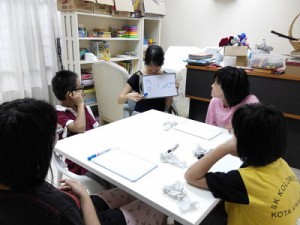
Q. Is this a one-off initiative with this community or there will be considerations for a longer term collaboration?
A. We are definitely considering a long-term collaboration but a lot will depend on the availability of funds and the community’s response to the progress that has been made by the home especially in terms of sustaining the initiatives that we have started there. We believe that the administrators of BH should display the same seriousness that we have in our commitment to improve the quality of life of their residents by taking the initiative to incorporate all the suggestions we have made in terms of what the current “best practices” are for children with special needs.
Q. What do you hope to achieve?
A. – short and/or long term for the people benefitting from this project
Overall, the project benefitted both Bukit Harapan and our students. Through discussions and mutual agreements with the management of Bukit Harapan and Dop, UNUK, we managed to create comprehensive learning profiles of the students at Bukit Harapan, aid transfer of skills (from our students to the staff), provided short-term specialised intervention for a few of the residents, and enhanced the physical learning environment of Bukit Harapan. Upon returning from Bukit Harapan, the team is still following-up on external support (e.g., schooling, specialised intervention) that we managed to establish for a few of the residents.
– for the students (opportunity you are creating by initiating this project with student involvement)
This project provides opportunities for real-life experiential learning. From planning to conducting a needs assessment analysis and to providing solutions, our students had the opportunity to implement all of these through a collaborative process with two other agencies (i.e., DoP and Bukit Harapan). Teamwork, though efficient, is not always a straight-forward process. Our students learnt the skills of communication and negotiation in order to come up with solutions that met everyone’s needs.
Q. What help do you need, if there are any? If yes, what would it be and who do they contact for details?
A. Since the home is financially dependent on donations and funding from well-wishers, we took the initiative to also hold discussions with several prominent service clubs in Kota Kinabalu. Currently, there is a great possibility that the Rotary Clubs in Kota Kinabalu will jointly fund a speech therapist to provide speech therapy to six residents who need such intervention.
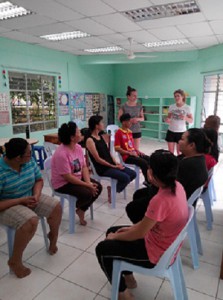 Questions for students who were involved in this project:
Questions for students who were involved in this project:
Name, year and programme of study
Lim Hooi Shan, 1st year, PhD in Applied Psychology
Q. What inspired you to be involved in this project?
A. I visited many government operated children homes in the Peninsular Malaysia and interviewed the children there for my Masters dissertation. Due to financial constraints, I could not involve the homes in Sabah or Sarawak. I am always passionate to help children with special needs. When I knew this project was fully funded and would be going to a home that I had to miss during my masters research, I almost immediately wanted to get myself involved in the project.
Q. What are you looking to achieve on a personal level thru this project?
A. In my clinical practice as a clinical psychologist insofar, I could only see clients in clinical settings and had no opportunities to see their improvements or struggles outside the clinical sessions. This project gave me a chance to live in the same home with the children and understand them better. It enhanced my experiences in helping children with special needs, and working together in a multidisciplinary teams (special education and physiotherapy).
Q. How will you be contributing to this project?
A. I helped to look for suitable psychological tools to screen the school-aged residents for their school readiness skills, such as personal-social skills, basic communication skills, basic literacy skills, basic numeracy skills, eye and hand coordination skills. Together with Constance, we had screened all 14 school-aged residents there and prepared an individual report with recommendations for each of them. As a clinical psychologist, I also provided play therapy for two residents with emotional and behavioural issues. We had few meetings with the teaching staffs there on suggestions to improve their teaching methods, teaching materials, and teaching techniques. I also helped to organise the educational materials and library materials, paint some book shelves, move the furniture from the old classroom to the bigger classroom, clean the big classroom and set up a small library and play corner for them. Together with Dr. Siva, we managed to help two residents to go back to school after some discussions with the school management.
Q. Describe what success will look like for the project
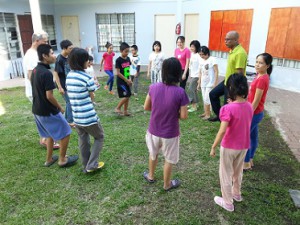 A. We managed to accomplish a few short goals – Bukit Harapan has a new classroom which is not just bigger but equipped with a small library and cozy play corner. Through teaching demonstrations, we hope staff who have no prior teacher training would have more ideas on how to deliver manageable lessons using creative activities. We also categorised teaching resources according to themes, so that these resources are more accessible to the teaching staff. We shared our assessment findings with the teaching staff to help them understand each student’s developmental and learning profile. We also introduced the concept of grouping to the staff to help them manage the diversity of their classroom better. We made contacts with local schools and now, more residents can have access to government school with special needs class.
A. We managed to accomplish a few short goals – Bukit Harapan has a new classroom which is not just bigger but equipped with a small library and cozy play corner. Through teaching demonstrations, we hope staff who have no prior teacher training would have more ideas on how to deliver manageable lessons using creative activities. We also categorised teaching resources according to themes, so that these resources are more accessible to the teaching staff. We shared our assessment findings with the teaching staff to help them understand each student’s developmental and learning profile. We also introduced the concept of grouping to the staff to help them manage the diversity of their classroom better. We made contacts with local schools and now, more residents can have access to government school with special needs class.
Q. What message do you have for other students?
A. For those who are looking for a real-life experience in working and staying together with individuals with special needs, this project is for you. I had learned so much in the past 3 weeks. It was an eye-opening and adventurous experience. The residents and staff there taught me a lot. Learning about special needs from textbook or just clinical is not sufficient, you only understand them on a surface level. But, living with them for a few weeks can make you better understand them at a deeper level.
Questions for students who were involved in this project:
Name, year and programme of study
Constance Yuen, Year 1, MA in Special Needs.
Q. What inspired you to be involved in this project?
A. I wanted to gain more experience in working with children with special needs, especially those with more severe needs. I was also very interested to know more about how homes and NGOs in Malaysia are managed and run. In addition, I was excited about collaborating with lecturers and students from multiple disciplines from both the UNUK and UNMC campuses. Thus, when this opportunity came up, I quickly applied for it.
Q. What are you looking to achieve on a personal level thru this project?
A. Joining this project, I was excited about learning applicable skills and knowledge that would greatly shape my professional view and skills repertoire. I am glad to say that I have gained valuable experience working and interacting with the residents in such an intimate setting as the home.
Q. How will you be contributing to this project?
A. Together with the Education Team, I conducted a needs assessment to identify needs of the residents of and teaching staff in Bukit Harapan. This needs assessment was carried out through informal interviews, screening tests for the students, meeting with teaching staff etc. Then, we worked on achieving both short term and more sustainable goals to address these needs. In the three weeks that we were there, we managed to prepare an educational profile of all the school-going children, train the teaching staff to carry out a variety of educational activities, create a more conducive learning space for the students, and also made connections with local professionals and NGOs to facilitate long-term support for Bukit Harapan.
Q. Describe what success will look like for the project
A. The project has achieved a few short-term goals as mentioned above. However, I believe that greater success can only be seen a few months from now when students achieve further growth due to the changes that the teachers make in class after the training received and also due to sustained collaboration between the local community and Bukit Harapan. Monitoring of progress is essential to achieve this.
Q. What message do you have for other students?
A. As students of the University of Nottingham, we are very fortunate that the university supports projects that enable us to learn from real-world experiences and to contribute to the community at the same time. Hence, always be on the look out for opportunities like this to further enrich your learning at Nottingham!
-Ends-
More information available from Dr. Wong Tze Peng on TzePeng.Wong@nottingham.edu.my

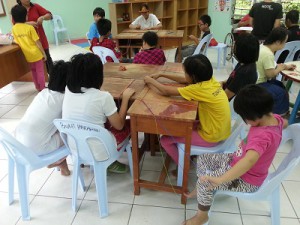
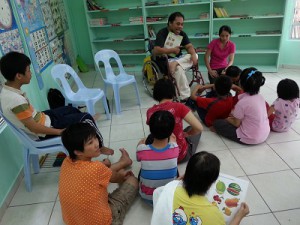
[…] Blog on The Regardless of Disability, Everyone has a Right to a Future […]